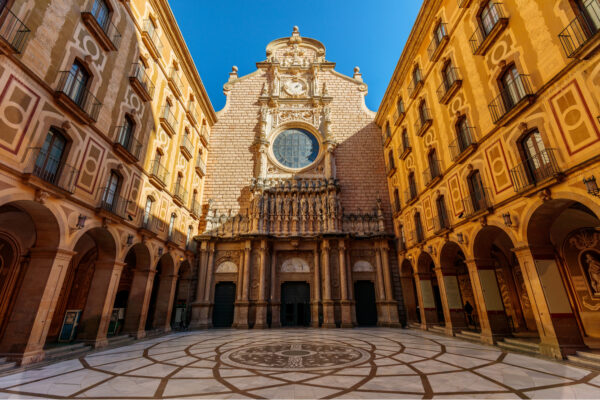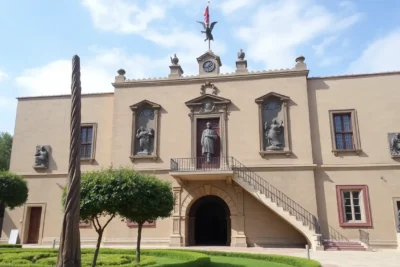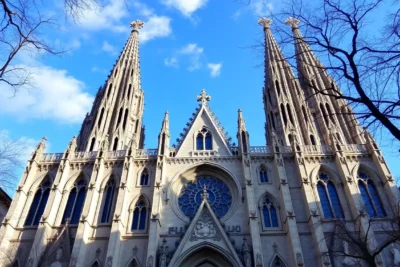
The history of Montserrat Monastery, a site of immense cultural and religious significance in Spain, took a dark turn during the Napoleonic Wars. As armies clashed and empires rose and fell, this tranquil sanctuary became a target of destruction, sparking debates and speculations that continue to intrigue historians and enthusiasts alike.
Amidst the turbulent backdrop of the early 19th century, the question remains: **The Intriguing Mystery: Why did Napoleon Destroy Montserrat Monastery?** This inquiry delves into the motivations behind the actions of one of history's most iconic figures, offering insights into the interplay of power, faith, and the tumult of war.
The Historical Context of Montserrat Monastery before Napoleon's Destruction
The Montserrat Monastery, located near Barcelona, has long been a symbol of Catalan spirituality and culture. Established in the 10th century, it became a significant pilgrimage site, attracting thousands of devotees each year. Prior to its devastation during the Napoleonic Wars, Montserrat was renowned for its rich collection of art and relics, which included the famous Black Madonna, a revered statue that represented the heart of Catalan identity.
Throughout the centuries, Montserrat served not only as a religious center but also as a cultural bastion. Its monks contributed to various fields such as education, music, and literature. The monastery's library housed invaluable manuscripts, making it a critical institution in the preservation of knowledge during a time when many libraries faced destruction. The relationship between Montserrat and its surrounding region further solidified its importance, as it became a focal point for local communities.
During the late 18th and early 19th centuries, the political climate in Europe shifted dramatically, particularly with the rise of nationalism and the impact of the French Revolution. This period saw the monastery caught in the crossfire of Barcelona and Napoleon's military campaigns. The strategic location of Montserrat made it a target, as it symbolized both religious devotion and regional pride, raising the stakes in the ongoing conflict between the French and Spanish forces.
As tensions escalated, the monastery faced threats that were not solely physical. The cultural implications of its destruction represented a broader struggle between Spanish identity and French imperialism. Montserrat's fate during this tumultuous period serves as a poignant reminder of the fragile interplay between faith, culture, and war, raising essential questions about the motivations behind Napoleon's actions in the region. The complex dynamics of Barcelona vs Napoleon highlight the intricate historical narrative surrounding this iconic site.
Unraveling the Reasons Behind Napoleon's Attack on Montserrat Monastery
Unraveling the reasons behind Napoleon's attack on Montserrat Monastery reveals a multifaceted interplay of military strategy, cultural significance, and political ideology. Napoleon's forces viewed Montserrat as more than just a religious site; it symbolized the spirit of Catalonia and Spanish nationalism, making its destruction a tactical move in the broader context of their campaign against Spain. This act aimed to undermine local morale and assert French dominance in the region, particularly in the face of resistance from Barcelona and its surroundings.
Several factors contributed to Napoleon's decision to target Montserrat:
- Strategic Location: Montserrat's elevated position offered significant military advantages.
- Cultural Impact: The monastery's destruction was intended to diminish the Catalan spirit and nationalism.
- Symbolic Gesture: By attacking a place of spiritual significance, Napoleon aimed to convey a message of control over both faith and culture.
Moreover, the destruction of Montserrat can be interpreted as part of Napoleon's broader campaign to reshape Europe according to his vision. The monastery, with its deep historical roots, represented an enduring cultural heritage that was at odds with Napoleon's imperial ambitions. Thus, the attack exemplified the conflict between Barcelona and Napoleon, where the monastery became a casualty of a larger struggle for identity and power.
In conclusion, the assault on Montserrat Monastery serves as a poignant reminder of how wars can transcend mere military engagements, influencing the very fabric of cultural and national identity. As historians continue to explore the intricate layers of this event, the motivations behind Napoleon's actions remain a compelling subject of study, shedding light on the complex relationship between faith, culture, and warfare during this tumultuous period.
The Symbolic Significance of Montserrat Monastery in the Napoleonic Era
During the Napoleonic era, Montserrat Monastery held profound symbolic significance, representing not only a center of spiritual refuge but also a stronghold of Catalan identity. Its destruction by Napoleon's forces resonated deeply with the local population, invoking sentiments of loss and resistance. The monastery was emblematic of the struggle between Barcelona and Napoleon, highlighting the broader conflict between imperial power and national pride.
In addition to its religious importance, Montserrat served as a cultural beacon that fostered a sense of community among Catalans. The monastery was a repository of artistic treasures and historical manuscripts, which played a vital role in preserving the region's heritage. The implications of its attack were profound, as it sought to diminish the collective spirit of Catalonia, making Montserrat a target of strategic and symbolic importance.
Key factors contributing to Montserrat's significance during this era included:
- Cultural Heritage: The monastery was a vital part of Catalan history, embodying centuries of tradition.
- National Identity: Montserrat was a symbol of resistance against foreign domination and played a crucial role in the forming of Catalan nationalism.
- Military Strategy: Control over Montserrat was viewed as essential for asserting dominance in the region, influencing the dynamics of Barcelona vs Napoleon.
Ultimately, the fate of Montserrat Monastery during the Napoleonic Wars underscores the intricate relationship between faith, culture, and conflict. Its destruction was not merely an act of war but a calculated move to undermine the resilience of a people determined to uphold their identity amidst the encroaching shadows of imperialism.
How Montserrat Monastery's Destruction Shaped European Religious Sentiment
The destruction of Montserrat Monastery had a profound impact on European religious sentiment, particularly in Spain. As a revered site for pilgrimage and spirituality, its loss resonated deeply with the faithful, intensifying feelings of grief and resistance among local communities. This event symbolized not just a physical attack but also an assault on the very heart of Catalan identity, further polarizing the sentiments towards French imperialism and igniting discussions about the preservation of cultural heritage in the face of tyranny.
Moreover, the aftermath of Montserrat's destruction served as a rallying point for those opposing Napoleon's rule. The monastery became a symbol of resilience, with many viewing its obliteration as a clarion call to defend their faith and culture against foreign domination. This sentiment fueled a surge in nationalism, as Catalans sought to reclaim their identity amidst the turmoil, emphasizing the delicate balance between faith and political power in the evolving narrative of Barcelona and Napoleon.
Key elements that shaped the European religious sentiment during this period included:
- Mobilization of Faith: The attack galvanized religious communities, uniting them in a common cause against oppression.
- Strengthening of National Identity: The destruction ignited a revival of Catalan nationalism, linking faith with cultural pride.
- International Sympathy: The event drew attention beyond Spain, eliciting compassion and support for the plight of Catalans.
Ultimately, the fate of Montserrat Monastery during the Napoleonic Wars highlights the intricate interplay between warfare and religious identity. Its destruction not only impacted local beliefs but also resonated throughout Europe, shaping perceptions of faith, resilience, and the struggle against imperialism, thus illustrating a significant chapter in the broader historical narrative of Barcelona vs Napoleon.
Examining the Cultural Impact of Napoleon's Actions on Montserrat Monastery
The cultural impact of Napoleon's destruction of Montserrat Monastery was profound and far-reaching, marking a significant chapter in the history of Catalonia. The monastery was more than just a religious site; it was a symbol of cultural heritage and Catalan identity. Its obliteration represented an assault on the collective spirit of the Catalan people, igniting a sense of grief and resistance that would resonate throughout the region, particularly as tensions escalated between Barcelona and Napoleon.
In the wake of the destruction, Montserrat evolved into a powerful symbol of resilience and defiance against oppression. Its loss galvanized local communities, uniting them in their shared sorrow and determination to reclaim their cultural identity. This cultural awakening was crucial in shaping a renewed sense of Catalan nationalism, as the monastery's legacy continued to inspire resistance against foreign domination, emphasizing the importance of preserving cultural sites as symbols of national pride.
Moreover, the impact of Montserrat's destruction extended beyond local sentiments, prompting international attention and sympathy for the Catalan cause. As news of the attack spread, it drew the ire of those who valued cultural heritage, sparking discussions on the importance of protecting such sites from the ravages of war. The event highlighted the delicate balance between faith and political power, further complicating the ongoing narrative of Barcelona vs Napoleon as it unfolded across Europe.
Ultimately, the cultural ramifications of Napoleon's actions at Montserrat Monastery illustrate how conflicts can profoundly alter the identity of a people. The destruction of this cherished site served as a catalyst for cultural revival, ensuring that the spirit of Montserrat would endure, influencing generations and fostering a renewed commitment to preserve Catalonia's rich heritage amidst the challenges of imperialism.
The Legacy of Montserrat Monastery: From Spiritual Haven to Historical Enigma
The legacy of Montserrat Monastery extends beyond its spiritual significance, transforming into a historical enigma that captivates scholars and tourists alike. Once a serene refuge for pilgrims, its destruction during the Napoleonic Wars marked a turning point that reshaped Catalan identity. The monastery, a symbol of resistance against oppression, became a poignant reminder of the delicate balance between faith and cultural heritage in the face of imperial ambitions.
As Montserrat's story unfolded, it showcased the complex interplay of Barcelona and Napoleon, where the monastery stood at the crossroads of military strategy and cultural symbolism. The remnants of its artistic treasures and historical manuscripts underpin its role in preserving Catalonia's rich heritage. This cultural bastion not only nurtured local spirituality but also fostered a collective identity, making its loss felt on both personal and communal levels.
Key elements that define Montserrat's legacy include:
- Symbol of Resistance: The monastery's destruction ignited a strong sense of Catalan nationalism and resistance against foreign rule.
- Cultural Preservation: Montserrat’s extensive library and artistic collections played a crucial role in maintaining Catalonia's cultural narrative.
- Historical Significance: Its ruins serve as a stark reminder of the impacts of war on spiritual and cultural landscapes.
Ultimately, Montserrat Monastery's transformation from a spiritual haven into a historical enigma reflects the enduring struggle between local identity and imperial forces. The legacy it leaves behind resonates deeply within Catalonia, influencing generations to champion their cultural heritage amidst the trials of history, and posing ongoing questions about the intricate dynamics of Barcelona vs Napoleon.
 Why Do People Visit Montserrat: Unveiling the Allure of Barcelona's Sacred Mountain
Why Do People Visit Montserrat: Unveiling the Allure of Barcelona's Sacred Mountain Unusual Secrets: Exploring the Mysterious Scratches on the Black Madonna's Face
Unusual Secrets: Exploring the Mysterious Scratches on the Black Madonna's Face Unveiling the Mystery: Why is Barcelona's Gothic Quarter called Gotham?
Unveiling the Mystery: Why is Barcelona's Gothic Quarter called Gotham?If you want to know other articles similar to The Intriguing Mystery: Why did Napoleon Destroy Montserrat Monastery? you can visit the category WHERE YOU CAN GO.
Leave a Reply










Read more!